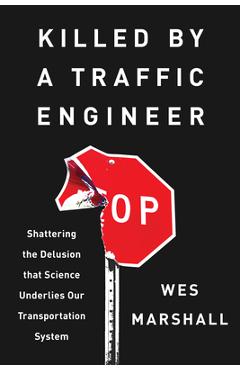Killed by a Traffic Engineer: Shattering the Delusion That Science Underlies Our Transportation System - Wes Marshall

Detalii Killed by a Traffic Engineer:
libris.ro
318.06 Lei
353.4 Lei
Transportation
Wes Marshall
Killed by a Traffic Engineer: - Disponibil la libris.ro
Pe YEO găsești Killed by a Traffic Engineer: de la Wes Marshall, în categoria Transportation.
Indiferent de nevoile tale, Killed by a Traffic Engineer: Shattering the Delusion That Science Underlies Our Transportation System - Wes Marshall din categoria Transportation îți poate aduce un echilibru perfect între calitate și preț, cu avantaje practice și moderne.
Caracteristici și Avantaje ale produsului Killed by a Traffic Engineer:
- Departament: sport-activitati-aer-liber
- Perfect pentru activități sportive și de aventură în aer liber.
Preț: 318.06 Lei
Caracteristicile produsului Killed by a Traffic Engineer:
- Brand: Wes Marshall
- Categoria: Transportation
- Magazin: libris.ro
- Ultima actualizare: 28-10-2025 01:22:05
Comandă Killed by a Traffic Engineer: Online, Simplu și Rapid
Prin intermediul platformei YEO, poți comanda Killed by a Traffic Engineer: de la libris.ro rapid și în siguranță. Bucură-te de o experiență de cumpărături online optimizată și descoperă cele mai bune oferte actualizate constant.
Descriere magazin:
In the US we are nearing four million road deaths since we began counting them in 1899. The numbers are getting worse in recent years, yet we continue to accept these deaths as part of doing business. There has been no examination of why we engineer roads that are literally killing us. Fixing the carnage on our roadways requires a change in mindset and a dramatic transformation of transportation. This goes for traffic engineers in particular because they are still the ones in charge of our streets. In Killed by a Traffic Engineer , civil engineering professor Wes Marshall shines a spotlight on how little science there is behind the way that our streets are engineered, which leaves safety as an afterthought. While traffic engineers are not trying to cause deliberate harm to anyone, he explains, they are guilty of creating a transportation system whose designs remain largely based on plausible, but unproven, conjecture. Thoroughly researched and compellingly written, Killed by a Traffic Engineer shows how traffic engineering research is outdated and unexamined (at its best) and often steered by an industry and culture considering only how to get from point A to B the fastest way possible, to the detriment of safety, quality of life, equality, and planetary health. Marshall examines our need for speed and how traffic engineers disconnected it from safety, the focus on capacity and how it influences design, blaming human error, relying on faulty data, how liability drives reporting, measuring road safety outcomes, and the education (and reeducation) of traffic engineers. Killed by a Traffic Engineer is ultimately hopeful about what is possible once we shift our thinking and demand streets engineered for the safety of people, both outside and inside of cars. It will make you look at your city and streets--and traffic engineers-- in a new light and inspire you to take action.

Produse asemănătoare
Produse marca Wes Marshall

Killed by a Traffic Engineer: Shattering the Delusion That Science Underlies Our Transportation System - Wes Marshall
![]() libris.ro
libris.ro
Actualizat in 28/10/2025
318.06 Lei